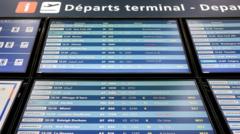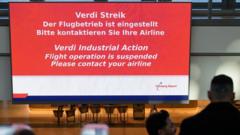With a significant impact on air travel, Air Canada's flight disruptions extend to thousands of passengers due to an ongoing strike by flight attendants, with federal government actions taken to mediate the situation.
Air Canada Flights Grounded Amid Flight Attendants' Strike

Air Canada Flights Grounded Amid Flight Attendants' Strike
Air Canada's operations come to a halt as attendants strike over wage disputes, prompting government intervention.
Air Canada has suspended all flights following a strike initiated by its flight attendants that began early Saturday. The carrier's decision to cease operations comes after contract negotiations stalled, leading the Canadian Union of Public Employees (CUPE), representing 10,000 attendants, to announce a 72-hour strike notice earlier this week. Disputes over wages and unpaid working hours were highlighted by the union, resulting in the strike commencing shortly after midnight.
As a result of the strike, Air Canada has started delaying and canceling numerous flights, with as many as 500 flights expected to be scrapped, impacting around 100,000 passengers. The airline's Air Canada Express service, which accounts for 20% of their daily traffic, is reportedly not affected, but potential disruptions could result in about 130,000 customers being inconvenienced each day, including a significant number of Canadians.
In response to the escalating situation, the Canadian government has intervened, invoking Section 107 of the Canada Labour Code to mandate binding arbitration between Air Canada and CUPE in order to relieve disruptions to the economy and travelers during peak summer season.
Air Canada claimed that it had been negotiating in good faith and recently proposed a 38% increase in total compensation over four years, with a 25% raise in the first year. However, the union rejected this offer, asserting it fell short of inflation and market standards, describing the proposed wage increase as effectively a pay cut.
The strike was supported by almost unanimous union voting, which led CUPE to express concern over the government's intervention, claiming it infringes on their rights and will only prolong the resolution of outstanding issues.
Earlier in the week, CUPE sought to address the airline’s earlier offer through independent arbitration, but this proposal was turned down. Following government pressure, the situation reflects greater urgency and complexity, especially as the Board of Trade for the Toronto region called for swift action amid concerns over tourism challenges due to the strike.
The duration of the strike remains uncertain, invoking historical parallels to past conflicts such as the 1998 pilot strike, which resulted in significant operational disruption for the airline.
As cancellations continue, Air Canada has issued advisories to affected passengers, encouraging those whose flights have been canceled to seek refunds and explore other travel options before heading to the airport. For round-trip travelers, it has been noted that return flights will not be automatically canceled, allowing them the option to adjust as needed without incurring fees.






















